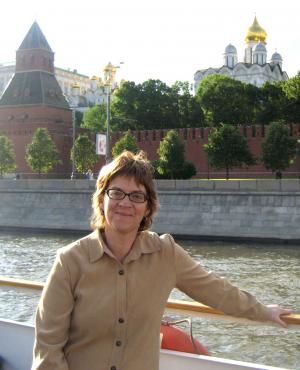Event Date:
Event Location:
- HSSB 6020 (McCune Room)
Event Price:
Free
Event Contact:
Salim Yaqub
Adrienne Edgar's new monograph, Intermarriage and the Friendship of Peoples, is the first book to examine ethnic and racial mixing in the Soviet Union. In marked contrast to its Cold War rivals, the Soviet Union celebrated mixed marriages among its diverse ethnic groups as a sign of the unbreakable friendship of peoples and the imminent emergence of a supra-ethnic “Soviet people.” Yet the official view of ethnic nationality became increasingly primordial and even racialized in the final Soviet decades. In this context, mixed families and individuals found it impossible to transcend ethnicity, fully embrace their complex identities, and become simply “Soviet.”
Adrienne Edgar is professor of Russian and Central Asian history at the University of California, Santa Barbara. She holds a B.A. in Russian from Oberlin College, an M.A. in international affairs and Middle East studies from Columbia University, and a Ph.D. in Russian history from U.C. Berkeley. She has received research grants and fellowships from the International Research and Exchanges Board (IREX), the Mellon Foundation, the Social Science Research Council, the Open Society Institute (Soros Foundation) and the Alexander von Humboldt Foundation and has held postdoctoral and visiting scholar appointments at Harvard University, McGill University, the Alexander von Humboldt University (Berlin) and the University of Heidelberg (Germany). Edgar’s first book, Tribal Nation: The Making of Soviet Turkmenistan, was published by Princeton University Press in 2004. Edgar is co-editor, with Benjamin Frommer, of Intermarriage from Central Europe to Central Asia: Mixed Families in the Age of Extremes (University of Nebraska Press, 2020). Her second monograph, Intermarriage and the Friendship of Peoples: Ethnic Mixing in Soviet Central Asia, was published by Cornell University Press in May 2022. Edgar serves on the editorial boards of Central Asian Survey and Kritika and recently completed a three-year term on the board of directors of the Association for Slavic, East European and Eurasian Studies (ASEEES).


